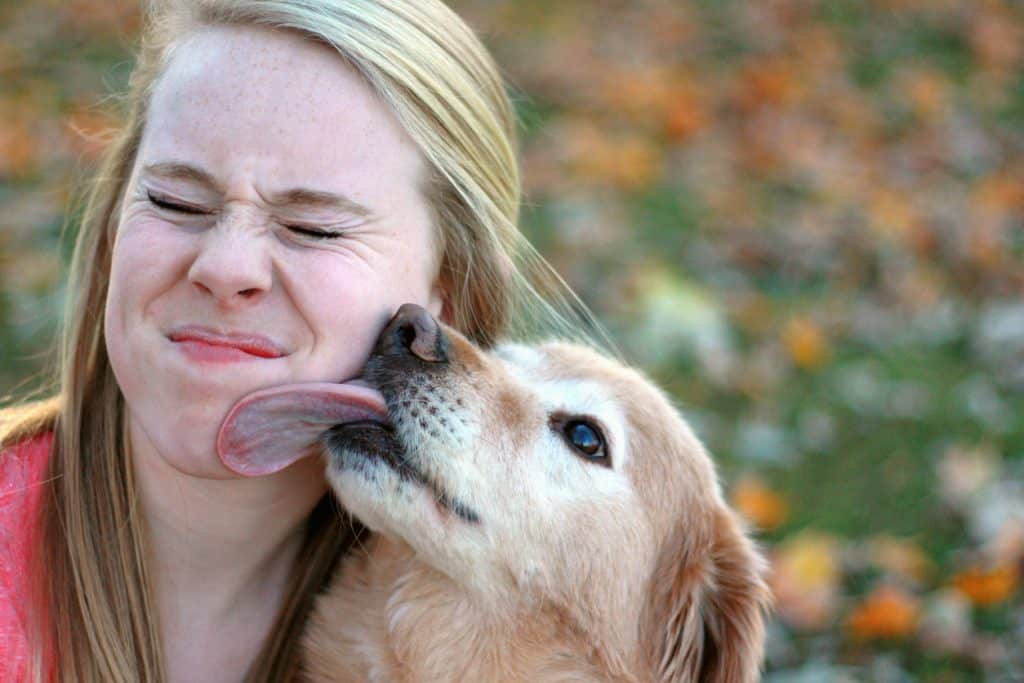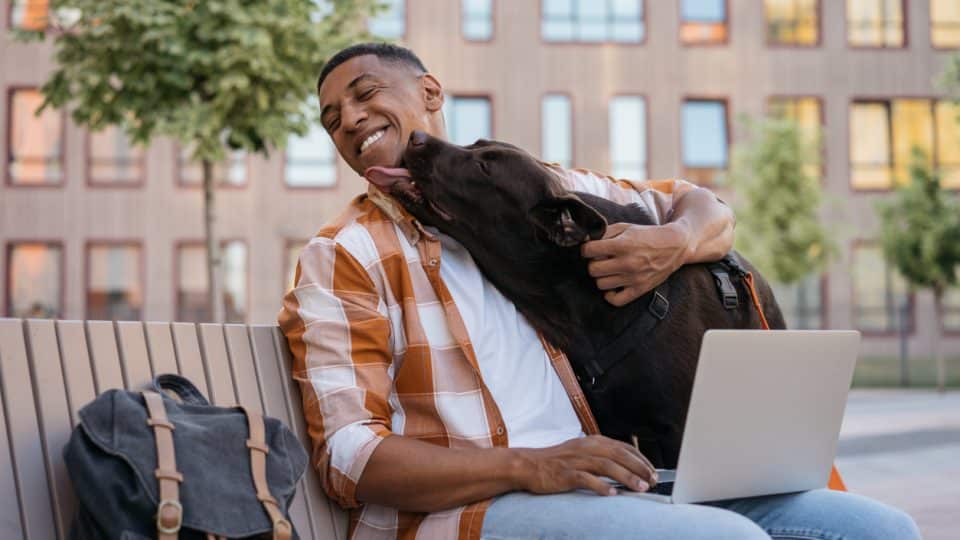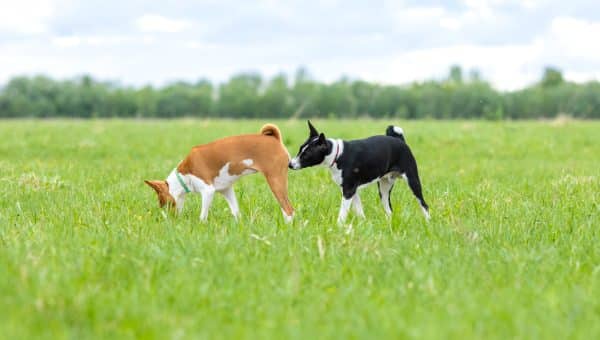- Not a substitute for professional veterinary help.
It’s no big secret – dogs love to lick! After all, it’s a natural and instinctual behavior that has a variety of causes. Licking could be a sign of attention, affection, expression, grooming, and so much more. In essence, a dog lick is a sign of communication and depending on how you respond to your dog, you may be reinforcing the behavior.
Or, it can sometimes be a sign of illness indicating pain, nausea, or discomfort. “Excessive licking is basically when your dog will not stop,” says Los Angeles-based author and Certified Professional Dog Trainer, Nicole Ellis.
However to stop all this licking, you have to know the cause—so you can redirect your dog appropriately or address any underlying causes of pain. To understand why dogs love to lick you so much, read on for six possible explanations and how to redirect them, if you aren’t in the mood.
1. To Show Affection
To your dog, you’re the world. Smothering you with “kisses” is his natural way of welcoming you home after a long day apart. He wants to express how delighted he is to be reunited. After all, it’s in a dog’s nature to lick you as a sign of love.
Redirection: If you want your dog to cuddle or lean against you instead of licking you, ignore them when they lick your hand or face. Get them to lay their chin on your knee or lap instead before showing them with praise.
2. To Get Attention
Licking is also your dog’s way of saying, “Hey, hello, look at me!” This attention-seeking behavior is usually reinforced with your positive responses—treats, kind words, or a pat on the head.
Redirection: While some of us would take licking over barking, many people also prefer neither to happen. Teach your dog to get your attention through talking pet buttons or by booping you with their nose instead.
3. You Taste Good
Plain and simple, your dog likes the taste of your salty skin. This is especially true when you’re perspiring (double yuck). Plus, your dog finds comfort in your scent.
You may have some food on your face or fingers that they find appealing. Or they may just be giving you a quick groom, like momma to a cub.
Redirection: This one is on you. Try washing your hands before interacting with your dog so they don’t get in the habit of enjoying leftovers from your fingers.
4. To Communicate a Need
Your dog may lick you as a way to request treats and food. Ellis notes that some dogs use licking as a form of communication, which means they may lick you if they want dinner, need to go potty, or have another request.
Redirection: Pet buttons are the answer here! You can also work on bell training for potty requests.
5. To Calm Their Stress
Licking can also be a self-soothing practice for your dog. “They could use licking to soothe themselves and their stress,” says Ellis. “And in the same way, also to soothe other animals, and even their humans, if we’re stressed.”
Licking behavior is a way for your dog to cope with stress and can be self-soothing. You may notice your dog licking more frequently if they exhibit separation anxiety or other behaviors indicating stress.
Licking also has the added bonus of releasing soothing endorphins that relieve stress. No wonder your dog’s all up in your face!
Redirection: Lick mats and snuffle mats are key here! We don’t mean to offend, but your dog may very much prefer licking peanut butter off a rubber mat than your face.
6. To Get You to Stop What You’re Doing
Pay attention to when your dog is licking you and other behaviors they are displaying before and after they give you a kiss. If you notice they shy their head away before licking you, they may actually be communicating a need for space. Watch out for those whale eyes!
Redirection: Licking may also be an appeasement signal, meaning that they want to show you they aren’t a threat. In this case, you may want to step away from your dog to give them space. Only continue interacting with them if they give obvious consent, like if they follow you and ask for interaction through a head boop or lick to the hand.
How to Get Your Dog to Stop Licking You
For those who do mind the licks, you’re also probably wondering how you can get your dog to stop. Keep in mind, it’s unlikely that a dog will stop licking you entirely, as licking your face is a natural behavior, which only becomes a problem when it can’t be redirected or becomes a constant nuisance.
That said, you can still try one of the following techniques:
1. Ignore it
When your dog starts licking you, walk away. Remove all attention, including eye contact. If this unwanted behavior goes unrewarded with your attention, it will become less frequent.
2. Give your dog a toy to occupy their mouth
Redirect a dog that licks a lot by offering an alternative—a chew toy, a good-quality bone, or a stuffed kong are all good options. These alternatives will keep him occupied by giving him something appropriate to lick.
3. Get some exercise
Just like with people, exercise can be an affective way to help manage stress. Taking a long walk will reduce your dog’s stress, which may reduce their urge to lick your face. This approach is especially useful with dogs who lick out of nervous compulsion.
4. Take a shower
Does your dog find you especially enticing after a long, sweaty workout? Washing up afterward will deter your dog from seeing you as a walking salt stick.
5. Change your body scent
“[Dogs] have what is called the Jacobson’s organ, and it’s actually located between the nose and the mouth,” says Ellis. So, if something smells good to a dog, i.e. your lotion, licking it lets them further experience that scent.
Certain scents are more enticing than others. Ellis says avocado or coconut-based scents and products are especially appealing to dogs. Peppermint, on the other hand, not so much! Try swapping out your body wash or perfume to a scent (and taste) your dog will find less appetizing.
6. Reward good behavior
For dogs who won’t stop licking, try giving them attention when they are behaving appropriately (as in not licking your face off). Rewards should take place immediately after the desired behavior for positive association.

Image source: melissaperryphotography | iStock
When Does Dog Licking Become Excessive?
For the most part, having your dog lick your skin is not cause for concern. There are, however, a few negative scenarios to keep an eye on.
1. Excessive licking can be a symptom of anxiety or OCD
“When a dog is stressed, often they will pick up a behavior just like we often do,” says Ellis, kind of like a nervous habit. “So often our dogs will start licking, and that’s kind of a calming repetitive behavior.” If you notice your dog obsessively licking you (or another object), he could be suffering from anxiety or an obsessive-compulsive disorder. This extreme behavior warrants a vet visit to explore possible treatments.
2. Licking can spread germs
“Dogs have bacteria in their mouths that are zoonotic—which means they can be passed down to humans, and those can cause gastrointestinal issues,” says Ellis.
As any pet parent can tell you, dogs aren’t exactly the most hygiene-conscious creatures when it comes to what they put in their mouths. They can carry all kinds of nasty bacteria and parasites in their saliva, which is not the kind of stuff you want on your face.
3. Licking can become a major nuisance
In the end, if your dog exhibits excessive licking, and it’s affecting you or others negatively, then the behavior is a problem. Maybe your dog bothers guests, or perhaps you’d simply prefer to skip the onslaught of saliva every day after work.
“Sometimes it can be annoying,” says Ellis of our dogs licking us, “but it’s important to also take it seriously and see if there is a medical reason.” If your dog’s licking behavior is a source of concern, it’s always best to check in with your veterinarian.
You can also try and help curb enthusiastic licking with a few simple changes. The key (as with any training) is consistency. Try implementing one or more of the techniques above the next time your dog gets a little too close for comfort.



